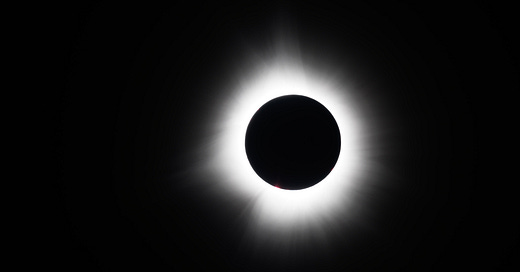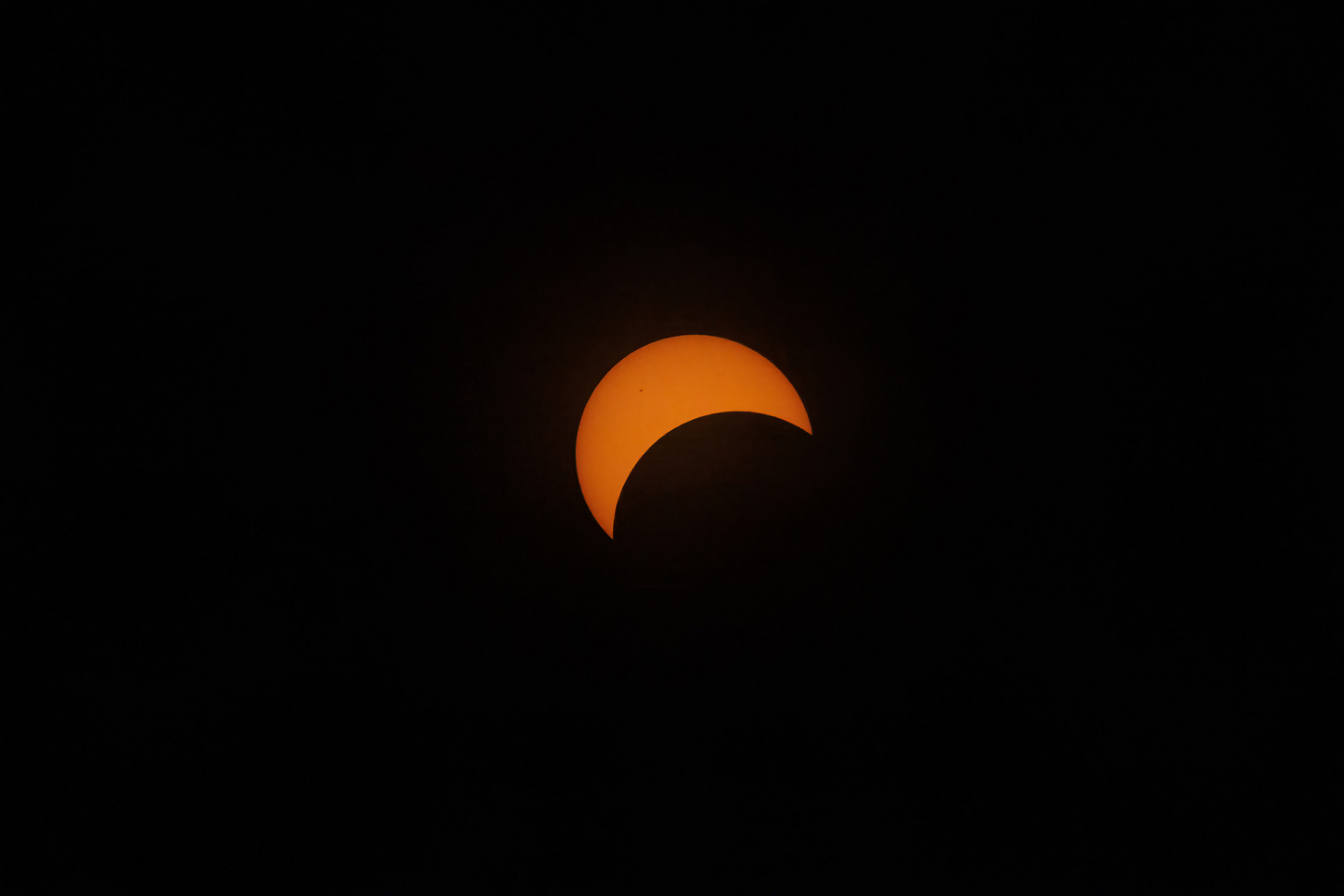Greetings, book and treat people! On Monday I drove up to northern New Hampshire with my family to watch the eclipse. There are many, many sagas I could share about this adventure, including the saga of the traffic on the way home (as I said to my parents and my brother during our 7.5 hour drive, “this is the wildest time I’ve ever had in a car!”), but the only one I want to share is the saga of the wild luck I felt, looking up into the dark sky during those three minutes of totality.
I feel a lot of things about the world: devastation, wonder, endless love, roiling rage, grief that comes in waves, pure delight. Awe—that sensation of being undone, bowed over, remade by the universe we live in—is not new to me. And yet. I had no idea what experiencing a total eclipse would feel like. I can try to tell you about it, tell you what happened: how the temperature dropped suddenly; how the light got eerie; how, when the moon finally blocked out the sun and the corona flared, two planets blinked into glittering light. I could tell you about the darkness that settled over the field, the pink-gold sunset clouds on the horizon, the silver-black surface of the moon.
I’ve been writing and reading and studying poetry this year. I’ve been thinking a lot about poetics—what it takes to build and create a poetics, a geography and architecture of words and thought and feeling. I’ve been thinking a lot about why I am so drawn to poetry right now, what it is about this ancient, mysterious art form that moves me so deeply, excites my nerves so deliciously, draws me so close. I suspect I’ll never find the answer, which, of course, is part of the answer.
One thing I do know is that poetry, in its weirdness, its sometimes-illegibility, its dedication to play and surprise and mystery, is a kind of writing that uses nonsense to describe feelings and experiences and ideas that are too unwieldy for words. Poetry does not try to make things easy. The poetry I love the most feels like a series of translations and transformations: words arranged like shapeshifters, lines built to look and feel like forests, underwater caves, a spinning galaxy.
Here’s a poem I love from one of the collections I’m currently reading, Sumita Chakraborty’s Arrow. It’s one way to translate what seeing the eclipse felt like.
O Spirit I have not been able to build the etymology of love. The word, in its weight, is an eclipse.
Another way to translate the feeling: this poem by Ross Gay:
Thank You If you find yourself half naked and barefoot in the frosty grass, hearing, again, the earth's great, sonorous moan that says you are the air of the now and gone, that says all you love will turn to dust, and will meet you there, do not raise your fist. Do not raise your small voice against it. And do not take cover. Instead, curl your toes into the grass, watch the cloud ascending from your lips. Walk through the garden's dormant splendor. Say only, thank you. Thank you.
This month (National Poetry Month!) I’ve been following this fantastic prompt calendar to guide my daily poem-writing. The form prompt for the day of the eclipse was a sonnet, so I wrote one while sitting with my family on a field in Colebrook, New Hampshire. The spring sun was warm. There were patches of snow in the woods. We were surrounded by kids running around, people fiddling with tripods, groups of families and friends with elaborate setups—chairs and picnic spreads and games.
One of the joys of playing with form is that I often find something in a poem I write—a line, an idea, an image, that then becomes the seed of a different poem. This sonnet is a draft. I don’t know yet if it will turn into anything. It feels strange to share it, because, for a long time, I’ve felt that a “real poet” doesn’t share their work until it’s done. But who’s to say what a real poet does? Part of my poetry practice this year has been learning how to discard limitations that do not serve me.
So here’s the sonnet I wrote on the day of the eclipse. I’m not sharing it because it’s the best or most beautiful translation of the feeling I felt while watching that strange and gorgeous astronomical wildness in the sky. I’m sharing it because—wonderfully!—the act of sharing this poem-in-flux is one (of infinite) translations of that feeling.
Sonnet in Which the Future Does Not Scare Me It’s true—the sun will eat the earth and all the oaks and sweetfern glades and icy lakes and every patch of April-melted snow, it’s true what sings will crack, is cracking now— I know. I feel the tremors too, the weight of every mountain-skin we’ve mined, every hole our hands have dug to fill with bones. There was a morning once so still and blue that when I stepped out into it and let my shoulders down, I flew. And once an evening so thick with buzz and musk that when I knelt down in the dirt of it, I burst. It’s true the melting’s coming, and every river’s wrath. I know. But look: the starlit afternoon, the rising moon.
Catch you next week, bookish friends.







Your sonnet! I love reading your poetry. Thank you for sharing with us.
A beautiful sonnet Laura, I loved it so much thank you for sharing! As someone who could not see the eclipse because I didn’t live in the right part of the world this time, the sonnet made me feel an awe which (I think) makes me feel as if I was there. A gift!
Equally amazing photos taken by your Dad, I’m so impressed! A newsletter bursting with Sackton talent 💙